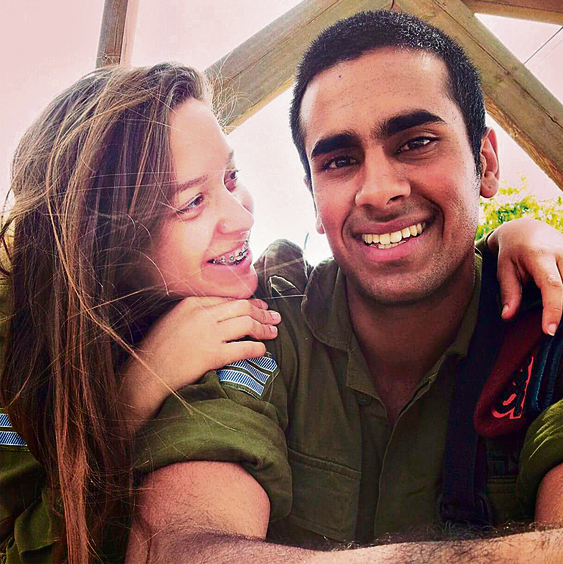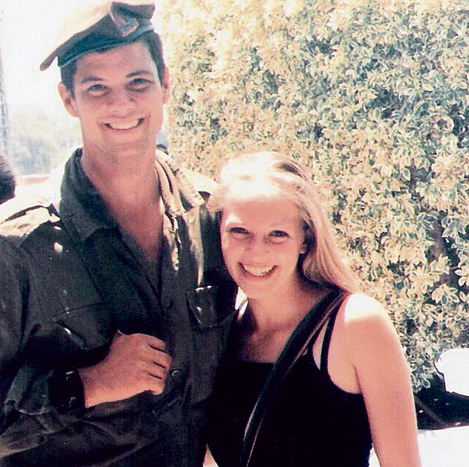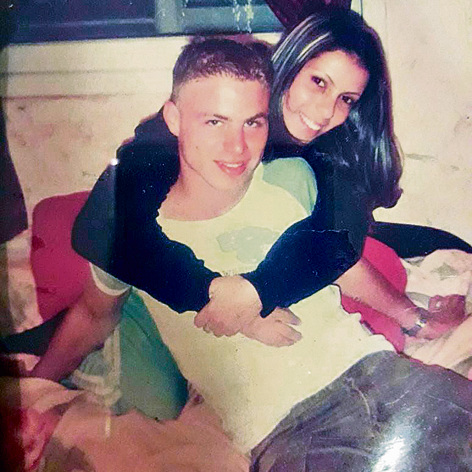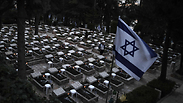
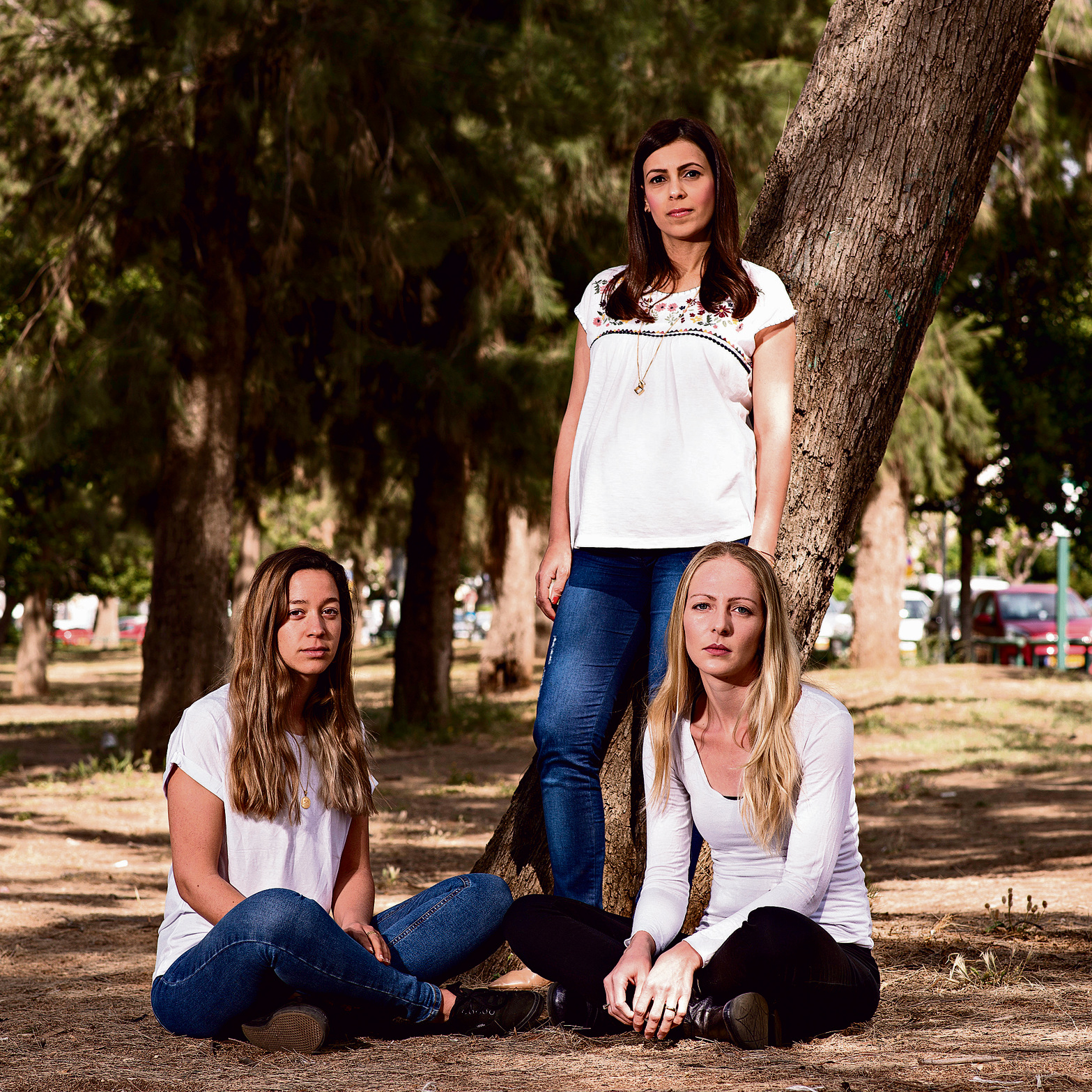
Another side of bereavement, the girlfriends
The confusing message, the persisting pain without official standing, the disparaging remarks; three girlfriends of fallen IDF soldiers talk about life after their loss, about the time that doesn't really heal, and about the new procedures in the IDF that are designed to make it easier for future bereaved girlfriends.
Ella Bar, Shani Omiel Feldman and Meital Mazula are three young women who lost their boyfriends in the line of duty. For them, bereavement is bereavement and loss is loss—even if there was no matrimony and their deep and one-time love was not institutionalized in the rabbinate. In the absence of official support from the IDF, all three were accompanied by the Survived by a Girlfriend organization, founded in 1998 to accompany the girlfriends of fallen IDF soldiers in coping with the loss. The organization, which handles no less than 400 girlfriends, was founded by Phyllis Haimovich and her daughter, Tamar Haimovich-Richter, after Michal, Phyllis' daughter, lost her boyfriend in Lebanon. The organization's CEO is Rina Cohen, who lost her partner in the Yom Kippur war.
After a continued push from their side, there has been a welcome change in the girlfriends' status: in the wake of their struggle, the procedures were changed in March 2010, so that the girlfriends of fallen IDF soldiers will receive news of the disaster from a Casualty officer, provided emotional support and entitled to days off during mourning. Ella, Shani and Meital welcomed the decision, and hope that it eases, if only slightly, the girlfriends' suffering.
Ella Bar lost the late Paz Eliyahu, who was killed in Operation Protective Edge
This year, Ella Bar and Lt. Paz Eliyahu were supposed to celebrate ten years together. According to the plan, Paz was supposed to propose to Ella and they were supposed to embark on a big trip together.
They met at Hashomer Hatzair's camp when they were in ninth grade and were together for seven years. "Paz was the most handsome man in the world. He had a big, bright smile. He liked to travel, enjoy life, and meet friends. He also enjoyed the army and served as an officer in the paratroopers. Paz was very modest. He was always outstanding in everything he did. He never told us if he received a certificate of excellence. We would always find it crumpled up somewhere in his bag," Ella recalled with longing.
Did you ever worry about him?
"Not during the operation or during his service. I knew he was great at everything, and that everything always worked out for him. Even during the operation, I was more concerned about my friends who were there, than for Paz, because I didn't allow myself to think about a situation in which I would live without him, and also because I trusted him to make sure everything would be all right."
Even though they lived together in his kibbutz apartment, Ella and Paz did not get to see each other much before he was killed. "He participated in Operation Bring Back Our Brothers to locate the three missing teens. He was able to arrange for a vehicle from the unit, so that he could pass through the kibbutz on the way to the south, to say hello to me, to give me a hug in the hopes that everything will be alright and end quickly."
During Protective Edge, the day before Paz died, Ella managed to hear from a friend who had served with him that his company was doing fine. "I came home with renewed strength, knowing that everything was fine and that nothing would happen to him."
Eliyahu, an officer in the paratrooper brigade, was 22 years old during Protective Edge. On July 23, 2014, he was killed by an explosive device during an operation in the Gaza Strip. "When I woke up in the morning, I saw that there was a new casualty. They released the name, and it was not Paz, and I felt a sense of relief. During the day, my friends began to evade me, tried to take my phone away so I couldn't receive messages. Everyone around me already knew. My parents did everything so I wouldn't find out from somebody else—they wanted to reach me and tell me themselves. Everyone helped them delay until they managed to reach me, at work. When my father came in, he didn't have to say anything," she recalled, choked up by tears.
The day of the funeral and the days of mourning remain vague. "You don't really understand what's going on around you, and fortunately, I have Paz's family who appreciated me and gave me the place I deserve. Respected me. They really accepted me as a daughter, just like when Paz was with us."
How are you today?
"The truth is that it gets worse; in the first year, you don't really understand what's going on, you're embraced by a lot of people… even today, it doesn't matter that you know he will never come back, you keep waiting… I went through a rattling experience and it was very difficult to get back to normal. I still can't. Every day it's a challenge to get up in the morning."
How did the surroundings respond to the loss you experienced?
"As an unmarried girlfriend, you get a lot of reactions. Today, I have a new boyfriend and it's hard for me to hear sentences from people like, 'Oh, so now you have a boyfriend, everything is okay.' No, everything's not ok. Unfortunately, that doesn't solve the problem or take away the pain. I'm trying to get on with my life… but it's hard for me to explain myself to society, because nobody knows what I go through at night, how painful it is for me, how I can fall to pieces from a song that starts playing, reminding me of Paz, or any small thing that brings back the memories. I try to live the life that Paz would have wanted me to live, and Paz wanted me to live life to its fullest. It's literally to live or die. There's no middle option. My new boyfriend accepts my coping with the loss. He's supportive, containing my pain."
What do you think about the new IDF guidelines?
"I hope they actually follow the new procedures. Unfortunately, more girls will join the cycle of bereavement. I hope they don't have to deal with the bureaucracy in government or military offices in order to prove who she was for her boyfriend, what role he played in her life. Paz was my entire life. I too had to prove what I was for him, and fight for my place, to show that I was also connected, that I should be invited to ceremonies, that I, too, wanted to hurt his death."
Shani Omiel Feldman lost Merom Fisher, who was killed in Operation Defensive Shield
"I met Merom when I was 15 years old on the school lawn," recalled Shani Omiel Feldman, now 32. "We met by chance. I was in 10th grade and Merom was in 12th grade. We were together for two and a half years—he was my first love and I was his."
"At first, my parents didn't want me to come over (to his parents' house—ed) before they met him, but Merom was reluctant to come because he was terribly shy. On New Year's, his father drove him over, and he sat in the car embarrassed, afraid to meet my parents. When they saw him, they immediately fell in love with him. They saw that he was the salt of the earth, that he is a shy, sweet guy and that was that—he instantly became a member of our household."
Sgt. Merom Fisher served in Golani's 51st Battalion. The period was full of horrific terrorist attacks, and after the terror attack at the Park Hotel in Netanya, the government decided to commence Operation Defensive Shield, which was meant to damage the terrorist infrastructure in the West Bank. Merom immediately joined the fighting in Ramallah and then went with his unit to the north. On Thursday, he was released home for the weekend, but was immediately called back in to fight with the company in Jenin. He was killed in the line of duty on Friday, April 5, 2002.
"On the day Merom was killed, his little brother was with my little sister. I picked him up and the plan was that I would bring him back to their house. Merom texted me, "Good morning from Jenin." We texted each other all day. I asked him, 'What's going on over there?' And he replied, 'War.' When he called me, I was at a traffic light and as I didn't have a hands-free device installed in the car, so I didn't answer. I thought to myself: in five minutes, I'll call him back. Five minutes passed and he didn't answered. The last message he sent me was around two o'clock in the afternoon. Two hours before he was killed. He wrote me that it was important for him to let me know that he loved me, 'so that if something happens to me, you know that you're everything to me, that you're the love of my life forever.' It was as if he sensed it.
"The day before Merom was killed, he returned for a few hours. He knew that his grandmother was traveling abroad and that he had to say goodbye before returning to base. He said, 'I'll just drop by, do laundry, give Grandma a kiss, and I'll go back.' He called me on the way to Kastina. Throughout the whole trip he said to me, 'I love you.' It was as if he was saying goodbye.
"His brother was with us and I was about to take him home for dinner. I sat down to study math, and suddenly I heard a knock at the door. It was Yair, Merom's older brother. He came into the room and told me, 'you better sit down.' I didn't understand what he wanted. And then he said, 'Merom was killed today in Jenin. I have to go.'
"They left and I told myself that it couldn't be. I picked up the phone and called him. Merom didn't answer. I felt that I had to leave the house. My father had been watching television and asked, 'Where are you going?' I yelled to hin, 'Dad, Meror has been killed.' During the shiva (week-long mourning period in Judaism), all that went through my mind was that we had to go through this shiva, that Merom would see that we behaved well and he would return."
Shani remembers the world spinning around her. "I went to his parents, and his father stood at the door and hugged me… I don't know how we went through that Shabbat until the funeral. That night, IDF officers arrived and Merom's mother asked permission to say goodbye. I said I had to see him for the last time as well. I didn't say it out loud, I didn’t know what my place was with the military. After they left, I went to his mother trembling and asked her to come say goodbye to Merom as well. She said, 'Sure.'
"On Sunday morning, his mother, his grandmother, and I went to the funeral home at Tel Hashomer… There was another family there, saying goodbye to their fallen soldier. We heard screams of anguish. It was horrible."
Marom's family "adopted" Shani. For eight months, until she enlisted herself, she was in their house every day, and at the cemetery. "When I came back from the army, I would go over to them for Friday meals, and they accepted me and helped me... His family was and still is wonderful."
How did the environment respond to the loss you experienced?
"People around me would see me, a 17-18-year-old girl devastated with a terrible depression and wouldn't understand ... Even the people closest to me told me, 'enough.' It took me years to recover… And I'm not even talking about the terrible talkbacks about the girlfriends of fallen soldiers who write things like: 'All you want is money.' I would hear sentences like, 'You are young and beautiful, it will pass' or 'Who knows if you would had ever had gotten married, you were together for a mere two years.'"
Shani welcomes the change in procedures in the IDF: "If you are a widow or even divorced, you have a social role. As a girlfriend, you fall between the cracks. You have no definition and depend on the kindness of the family. Therefore, in my opinion, any change now in the procedures is welcome. "
Ten years after Merom died, Shani married her partner, whom she met five years ago on a trip to India.
Meital Mazula lost the late Ofer Jerbi, who was killed in an operation in Gaza
Meital Mazula, 33, met Ofer Jerbi from Moshav Ben Zakkai during her military service. The two met at a pizzeria where they both worked. They were together for tree and a half years. "Ofer was an amazing person, he was always there for everyone… Two months before he was killed, he bought me a ring. We planned on moving in together in his parents' moshav. Even today, married and with a child, I wonder if he were alive, where we would be. Ofer was my first love, my first boyfriend. He was everything to me."
Sgt. Ofer Jerbi served in the Givati Brigade. He was sent to a course for commanders and senior sergeants. During the al-Aqsa intifada, he was deployed with his comrades on operation Steel Cavalry to locate lathes for producing Qassam rockets. On May 11, 2004, he was killed in the line of duty after a long night of fighting in the Zeitun neighborhood.
"Every evening… Ofer would update me, and then early in the morning, he would update me that he had left the area and that everything was fine," recalled Meital. "That morning, there was no message from him. His mother called me very early and asked, 'What's up with Ofer? He's not available.' She said that she had woken up at 5:53am, opened the closet in his room and saw a childhood picture of Ofer… On the morning news, they had already announced there was a multi-casualty event. His mother called me again and asked me to try and find out what was going on, adding, 'When they say there are casualties, they mean deaths. Just so you know, something bad happened to Ofer.' She really felt it."
At ten in the morning, Meital went with her mother to the bank. On the way, she received a call from Ofer's sister. "I didn't understand why she was calling; I asked her what was going on, and she said, 'Ofer was killed.' From that moment on, I don't really remember what happened. I remember saying to her, 'That doesn't make sense… No one told me anything.' And she said to me, 'But they told us.' At that moment, the world crumbled around me, I couldn't understand how the outside world continues to go on.
"It was a very difficult time. I quit my job. For two and a half months, I was unable to function until my mother picked me up and brought me back to work. I didn't have any support from anyone other than my family, which was there for me."
What do you feel about the change in procedures?
"I'm both happy and jealous. Part of the great difficulty at that time surrounded the issue of recognition, standing, and treatment. I wasn't a part of it. I was always on the outside. I heard all kinds of sentences making it clear that I had no legitimacy, neither from the establishment nor from the public."
Today, Meital is a social worker in the rehabilitation department for disabled people and victims of terrorism at the Social Security Institute in Holon. She is married and the mother of a four-year-old girl, with another child on the way. "Time makes it possible for you to return to normal life, but the longing increases. The fear of forgetting and memory that plays tricks—you are afraid to forget his voice. It happened in 2004, but it feels like yesterday."
(Translated and edited by N. Elias)















